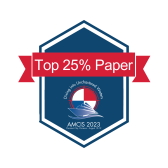Paper Type
Complete
Description
Using an active learning framework proposed by Shroff et al (2019), our study evaluates the impact of technology-enabled active learning (TEAL) on student learning in an Australian business school. Our study used the individual reflections of accounting students as the data collection strategy and content analysis. Our findings suggest that the three constructs of the framework - interactive engagement enabled by the technology during and after the workshops, development of problem-solving skills throughout the learning process, and individualized learning context facilitated by the accounting technology have all positively contributed to the learning effectiveness. We also found that technology-enhanced scaffolds designed in the learning process have aided in the consolidation of learning and increased learning effectiveness. However, our study observed that while technology was expected to have a positive influence on students’ curiosity and interest - the fourth factor in the framework, lack of student effort, poor timing of feedback, and the absence of a sense of challenge, have limited learning.
Paper Number
1428
Recommended Citation
Seethamraju, Ravi Chandra and Murthy, Vijaya S., "Impact of Technology-enabled Active Learning (TEAL) on Learning" (2023). AMCIS 2023 Proceedings. 15.
https://aisel.aisnet.org/amcis2023/sig_ed/sig_ed/15
Impact of Technology-enabled Active Learning (TEAL) on Learning
Using an active learning framework proposed by Shroff et al (2019), our study evaluates the impact of technology-enabled active learning (TEAL) on student learning in an Australian business school. Our study used the individual reflections of accounting students as the data collection strategy and content analysis. Our findings suggest that the three constructs of the framework - interactive engagement enabled by the technology during and after the workshops, development of problem-solving skills throughout the learning process, and individualized learning context facilitated by the accounting technology have all positively contributed to the learning effectiveness. We also found that technology-enhanced scaffolds designed in the learning process have aided in the consolidation of learning and increased learning effectiveness. However, our study observed that while technology was expected to have a positive influence on students’ curiosity and interest - the fourth factor in the framework, lack of student effort, poor timing of feedback, and the absence of a sense of challenge, have limited learning.
When commenting on articles, please be friendly, welcoming, respectful and abide by the AIS eLibrary Discussion Thread Code of Conduct posted here.




Comments
SIG ED